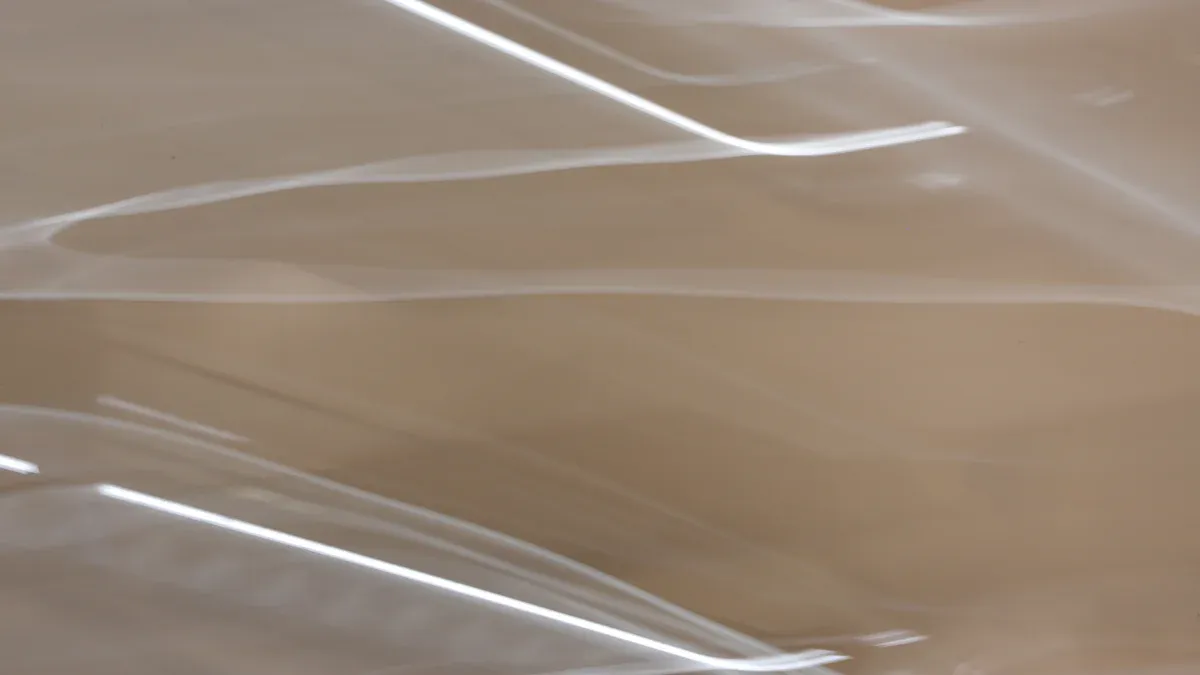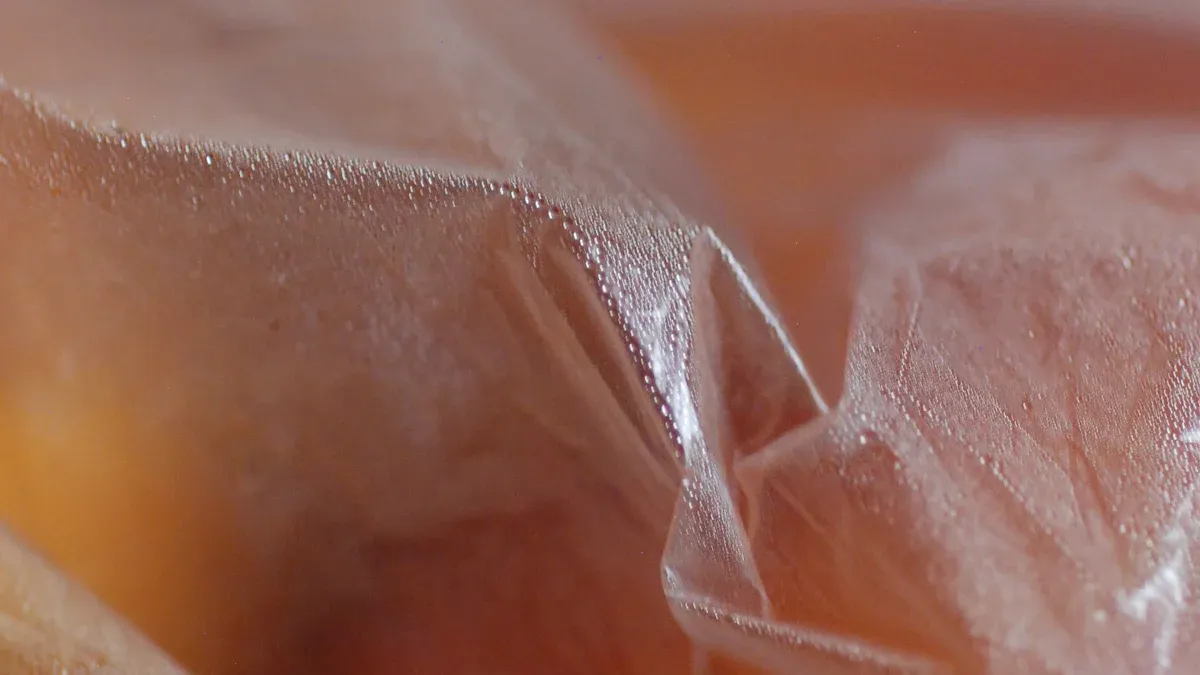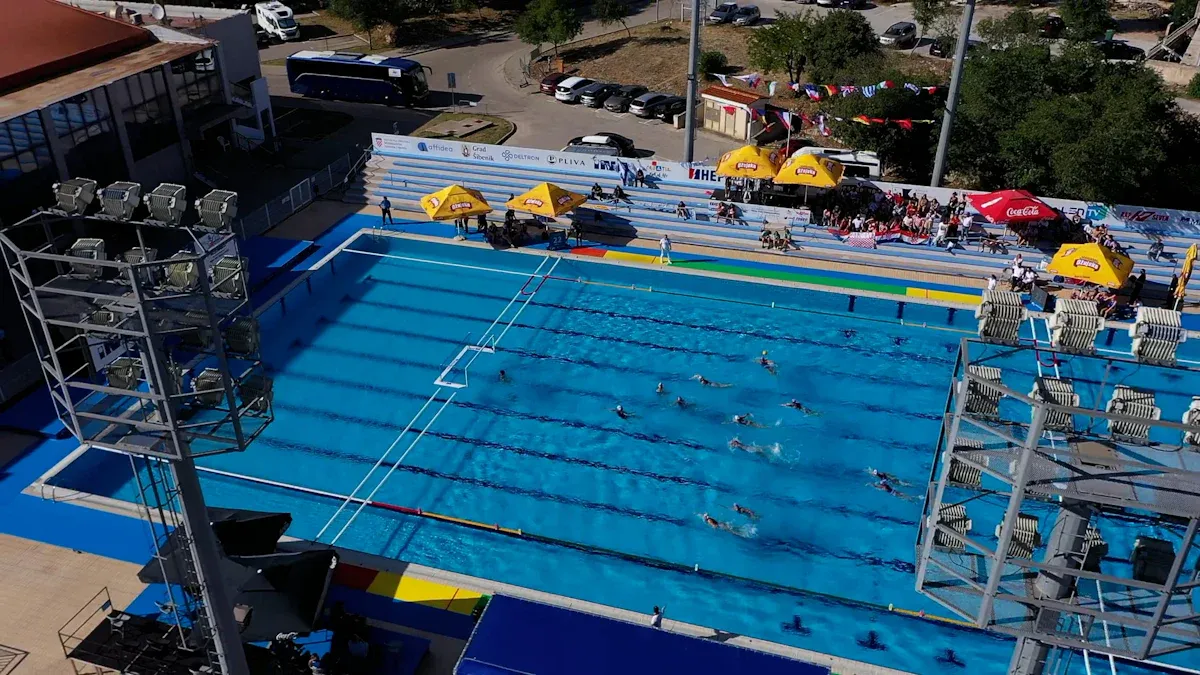








Polyester TPU is a kind of thermoplastic polyurethane. It uses polyester as its main material. This material is known for being very strong against chemicals. It also lasts a long time. Many companies use polyester TPU for things that must be tough and bend easily. People use it in medical textiles, marine safety gear, packaging, and car parts.
Key features:
It does not get damaged by oil or chemicals.
It does not tear or wear out easily.
It keeps water out and bends well.
The global TPU market, which has polyester TPU, was worth $2.53 billion in 2023. It is growing fast because it has many good qualities.
Polyester TPU is a tough and bendy plastic. It does not break easily. It can handle chemicals, oils, and damage. This makes it good for hard work. It works best in dry, hot, or oily places. It does not do well in wet or damp areas. Polyester TPU is stronger than polyether TPU. It also fights chemicals better. But it is not as good with water or sunlight. Polyester TPU is used in factories, medical tools, and outdoor things. It lasts a long time. It is safe to touch skin. You pick polyester TPU or polyether TPU based on what you need. Use polyester TPU for strength and chemicals. Use polyether TPU for wet or cold places.
Polyester TPU is part of the thermoplastic polyurethane group. It uses polyester as its main part. Manufacturers pick polyester TPU because it is strong and fights off chemicals. It is better than other TPU types in tough places. Many companies use polyester TPU in things that must last and not break.
Polyester TPU has a special chemical makeup. It has polyester-based polyols, which give it unique traits. The table below compares polyester TPU to polyether TPU:
Aspect | Polyester TPU | Polyether TPU |
|---|---|---|
Chemical Composition | Made from polyols with ester groups | Made from polyols with ether groups |
Abrasion Resistance | Great at sliding abrasion resistance | Best at impingement abrasion resistance |
Chemical Resistance | Very good against oils, fuels, and solvents | Good chemical resistance, better with water |
Hydrolytic Stability | Not as good with water and moisture | Very good with water and moisture |
Temperature Resistance | Handles high heat and aging better | Stays flexible in cold temperatures |
Mechanical Properties | Stronger, stiffer, and resists tearing | Bounces back more, more flexible |
Typical Applications | Used in industry, cars, and sports gear | Used in medical, flexible goods, outdoor gear |
Polyester TPU is stiffer and lasts longer. It works well in hot and chemical-heavy places. Polyether TPU is softer and works better in wet or cold spots.
Making polyester TPU takes a few steps:
Workers mix diisocyanates and polyester-based polyols in a reactor. They add chain extenders, crosslinkers, and catalysts to start the reaction.
The melted polymer goes into a twin screw extruder. Here, workers can add more things to change the TPU.
The extruder controls heat, pressure, and mixing. This makes sure the TPU melts right and gets the needed traits.
The melted TPU is cut into small pellets with an underwater pelletizer.
Note: Each step helps make polyester TPU strong and useful for many things.

Polyester tpu film is very strong. It can take a lot of force before it breaks. The table below shows how much it can stretch and pull:
Property | Typical Range for Polyester TPU Film |
|---|---|
Tensile Strength | About 27.6 MPa to 136 MPa (4000-9500 psi) |
Elongation at Break | About 320% up to over 600% |
This means polyester tpu film can stretch far without ripping. It goes back to its shape after being pulled. It is stronger than many other thermoplastic elastomers. It also wears out less quickly. The polar ester groups help make the material tough. This is why polyester tpu lasts in hard jobs like medical tools, outdoor gear, and layered fabrics.
Polyester tpu does not get damaged by oils or strong chemicals. The ester groups stop many chemicals from hurting the material. This makes it good for things like hoses, seals, and safety clothes. In tests, polyester tpu does better than polyether tpu with chemicals. It keeps its shape and strength after touching fuel or cleaners. But polyester tpu does not do as well with water as polyether tpu. It works best where it is dry or oily.
Polyester tpu film does not tear or wear down easily. The table below shows how it compares to polyether tpu:
Property | Polyester TPU | Polyether TPU |
|---|---|---|
Tear Resistance | Higher | Lower |
Tensile Strength | Higher | Lower |
Abrasion Resistance | Higher | Lower |
Chemical Resistance | Higher | Lower |
Because it resists tearing and wearing, polyester tpu film is used for rough jobs. It is found in outdoor gear, inflatables, and sports items. It sticks well to plastics like PVC. This makes it good for layered and coated fabrics. Its strength helps things last longer, even when used a lot.
Polyester tpu film keeps water out very well. It is hydrophobic, so water cannot get through. This makes it great for raincoats, tents, and medical covers. The film stays bendy and does not crack or leak. It can also make seams that keep out air and water. This is important for inflatables and safety clothes.
Some polyester tpu films let sweat out but block water. This helps people stay dry and comfy. Polyester tpu film is good for outdoor and medical uses. It stays bendy in the cold and keeps working in wet weather.
Note: Polyester tpu film is used in things like waterproof jackets, gloves, mattress covers, and medical tools. Its mix of strength, bendiness, and protection makes it a top pick for tough jobs.
Polyester tpu and polyether tpu are both thermoplastic polyurethanes. They have different chemical structures. Polyester tpu uses polyester-based polyols with ester groups. Polyether tpu uses ether-based polyols. This makes them act differently.
Aspect | Polyester TPU | Polyether TPU |
|---|---|---|
Chemical Composition | Soft segment polyols contain ester groups | Soft segment polyols contain ether groups |
Abrasion Resistance | Excellent sliding abrasion resistance | Outstanding impingement abrasion resistance |
Tensile Strength | Superior tensile and mechanical strength | Lower tensile strength |
Elastic Properties | High elastic properties | Higher rebound, better flexibility at low temperatures |
Chemical & Oil/Solvent Resistance | Good chemical and oil/solvent resistance | Less resistant to oils and solvents |
Hydrolysis Resistance | Poor hydrolysis resistance | Outstanding hydrolysis and microbial resistance |
Temperature Resistance | Better high temperature resistance and heat aging | Better low temperature flexibility |
UV Resistance | Lower UV resistance | Better UV resistance |
Density | Higher density | Lower density |
Typical Applications | Mechanical robustness, abrasion-intensive uses | Wet or outdoor environments, hydrolytic stability |
Polyester tpu is strong and resists chemicals and oils. Polyether tpu works better in wet or cold places. It does not break down from water or microbes.
Polyester tpu has many good points. It is strong and tough. It does not wear out fast. It stands up to chemicals and lasts a long time. Many companies use it for dry, oily, or hot jobs.
But polyester tpu also has some weak spots. It does not do well with water. It can break down in damp or humid places. Microbes in soil can attack it and make it weaker. Polyether tpu does not have this problem. It stays strong in wet or outdoor places.
Tip: Additives like antioxidants and UV absorbers help polyester tpu last longer in hard places.
Polyester tpu has a higher molecular weight than polyether tpu. This means it takes more time to make. The long chains move slowly. Workers need more time and energy to shape and cool it. Polyether tpu is easier to work with and cools faster. This saves time in factories.
Advantages of polyester tpu:
High strength and toughness
Excellent wear and chemical resistance
Good performance in dry and oily conditions
Long service life in the right environment
Disadvantages of polyester tpu:
Poor hydrolysis resistance
Susceptible to soil microorganisms
Lower UV resistance
Longer processing time due to higher molecular weight
You should pick polyester tpu or polyether tpu based on the job. Polyester tpu is best when you need strength and chemical resistance. It is good for machine parts, hoses, seals, and safety gear in dry or oily places.
Polyether tpu is better for things that get wet or stay outside. It does not break down from water or microbes. It lasts longer in wet places. People use polyether tpu for sandblast curtains, bumpers, and outdoor gear.
Polyester tpu can break down in soil or compost. Microbes attack its ester bonds. This helps cut down plastic waste. So, polyester tpu is good for compostable products. But if it touches soil or stays wet, it may get weak over time.
Heat and sunlight can also hurt polyester tpu. Too much sun and heat can turn it yellow and make it crack. It can lose its stretch and become brittle. Special agents can slow this down. Still, polyester tpu works best where there is less water and sunlight.
Note: Polyether tpu is better for wet or outdoor jobs. Polyester tpu is best for dry, chemical-heavy, or tough jobs.

Polyester tpu is used in many industries. It is strong and does not get damaged by chemicals. Factories use polyester tpu for conveyor belts, hoses, and safety gear. The material does not break down from oils or cleaning agents. It keeps its shape in hot and cold places. The table below shows how polyester tpu is used in factories and what it needs to do:
Industrial Applications | Performance Requirements Addressed |
|---|---|
Conveyor belting | Needs to be strong and resist damage from rubbing and chemicals |
Protective garments and gear | Must bend, stretch, and protect from hits and rubbing |
Fuel cell liners | Needs to resist chemicals and last a long time |
Hoses and hose jacketing | Must resist chemicals, rubbing, and bend easily |
Gaskets and seals | Needs to resist chemicals and be strong in different places |
Spill-containment structures | Must resist chemicals, last long, and work in many places |
Flood protection berms | Needs to work in many places and protect from hits |
Pneumatic bladders | Must stretch, bend, and protect from hits |
Geo-membranes | Needs to resist chemicals and work in many places |
Weather-resistant truck tarps | Must resist sunlight, rubbing, and work in many places |
Polyester tpu helps companies follow strict rules. It works well where machines are used a lot or face chemicals and weather.
Polyester tpu is used in many everyday things. You can find it in inflatable rafts, backpacks, and life jackets. It is also used in medical items like blood pressure cuffs and hospital beds. Polyester tpu does not tear or get damaged by chemicals as easily as other plastics. It stays bendy in cold weather and does not need extra softeners. Many products use polyester tpu because it is safe for skin and food. The table below shows safety rules:
Safety Aspect / Certification | Description |
|---|---|
Phthalate-Free and BPA-Free | TPU does not have phthalates or BPA, so it is safe for skin and food. |
FDA Compliance (21 CFR 177.1680) | TPU can touch food if it is not too hot. |
REACH Compliance | TPU meets EU safety rules and does not have bad chemicals. |
RoHS Compliance | TPU does not have dangerous substances. |
ISO 10993 | Medical TPU is safe for use in hospitals. |
Note: Polyester tpu is safe and does not cause allergies, so it is good for people with sensitive skin.
Polyester tpu works well outside and in factories. It stays strong in very cold places, even at -40°C. It does not get damaged by oil or rubbing. If you add UV blockers, polyester tpu lasts longer in the sun and bad weather. But it does not do well in wet or humid places. In hot and wet spots, it can get weaker over time. For long use, polyester tpu is best in dry, cool, or oily places. It can be recycled and colored for different jobs.
Tip: Polyester tpu is good for tents and inflatable boats. It is strong and safe, but do not keep it in wet places.
Polyester tpu is very tough and does not wear out fast. It can handle strong chemicals and lasts a long time. You can also make it harder or softer if needed. It works best in dry places or where there are lots of chemicals. If there is a lot of water or sunlight, it might not work as well. Polyether tpu is better for wet or outdoor places. The table below shows which material is best for each job:
Scenario | Best Material |
|---|---|
Chemical exposure | Polyester tpu |
High moisture | Polyether tpu |
High heat | Polyester tpu |
Flexibility needed | Polyether tpu |

Designers should pick polyester tpu for hard jobs. It is best when you need something strong and safe from chemicals.
Polyester TPU is special because it does not get hurt by chemicals or rubbing. It stays strong in dry and oily places. Many companies use it for things that must be tough and bend easily.
Factories can recycle polyester TPU by melting it and making new shapes. This helps cut down on waste. Many new products use recycled polyester TPU.
Polyester TPU does not have bad chemicals like phthalates or BPA. It is safe for skin and does not cause allergies. That is why it is used in medical and everyday items.
Polyester TPU is better at fighting chemicals and rubbing. Polyether tpu works best in wet or outdoor places. Designers use polyester TPU for dry, hard jobs and polyether tpu for moist spots.
Polyester TPU is found in conveyor belts, inflatable gear, medical tools, and outdoor gear. Its strength and chemical safety make it good for many tough uses.